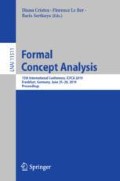Abstract
Formal concept analysis (FCA) derives a hierarchy of concepts in a formal context that relates objects with attributes. This approach is very well aligned with the traditions of Frege, Saussure and Peirce, which relate a signifier (e.g. a word/an attribute) to a mental concept evoked by this word and meant to refer to a specific object in the real world. However, in the practice of natural languages as well as artificial languages (e.g. programming languages), the application context often constitutes a latent variable that influences the interpretation of a signifier. We present some of our current work that analyzes the usage of words in natural language in varying application contexts as well as the usage of variables in programming languages in varying application contexts in order to provide conceptual constraints on these signifiers.
Access this chapter
Tax calculation will be finalised at checkout
Purchases are for personal use only
Notes
- 1.
NASA - NSSDC Photo Gallery Version: ftp://nssdcftp.gsfc.nasa.gov/photo_gallery/hi-res/planetary/venus/pvo_uv_790226.tiff, Public Domain, https://commons.wikimedia.org/w/index.php?curid=10914.
- 2.
Sketch of mace from https://commons.wikimedia.org/wiki/File:Boeheim_Morgenstern _01.jpg#/media/File:Boeheim_Morgenstern_01.jpg, Public domain.
- 3.
See [13] for a survey on the integration of description logics and formal concept analysis. It includes the representation of multiple formal contexts to represent concepts in non-hierarchical relationships.
References
Sparql 1.1 query language. Technical report, W3C Recommendation, 21 March 2013. http://www.w3.org/TR/sparql11-query/
Baader, F., Horrocks, I., Lutz, C., Sattler, U.: Introduction to Description Logic. Cambridge University Press, Cambridge (2017)
Cimiano, P., Hotho, A., Staab, S.: Learning concept hierarchies from text corpora using formal concept analysis. J. Artif. Intell. Res. 24, 305–339 (2005). https://doi.org/10.1613/jair.1648
Devlin, J., Chang, M., Lee, K., Toutanova, K.: BERT: pre-training of deep bidirectional transformers for language understanding. CoRR abs/1810.04805 (2018). http://arxiv.org/abs/1810.04805
Hesse, W., Tilley, T.: Formal concept analysis used for software analysis and modelling. In: Ganter, B., Stumme, G., Wille, R. (eds.) Formal Concept Analysis. LNCS (LNAI), vol. 3626, pp. 288–303. Springer, Heidelberg (2005). https://doi.org/10.1007/11528784_15
Leinberger, M., Lämmel, R., Staab, S.: The essence of functional programming on semantic data. In: Yang, H. (ed.) ESOP 2017. LNCS, vol. 10201, pp. 750–776. Springer, Heidelberg (2017). https://doi.org/10.1007/978-3-662-54434-1_28
Lin, D., Pantel, P.: Induction of semantic classes from natural language text. In: Proceedings of the Seventh ACM SIGKDD International Conference on Knowledge Discovery and Data Mining, San Francisco, CA, USA, 26–29 August 2001, pp. 317–322 (2001). http://portal.acm.org/citation.cfm?id=502512.502558
Meijer, E., Beckman, B., Bierman, G.M.: LINQ: reconciling object, relations and XML in the .net framework. In: Proceedings of the ACM SIGMOD International Conference on Management of Data, Chicago, Illinois, USA, 27–29 June 2006, p. 706 (2006). https://doi.org/10.1145/1142473.1142552
Mikolov, T., Sutskever, I., Chen, K., Corrado, G.S., Dean, J.: Distributed representations of words and phrases and their compositionality. In: 27th Annual Conference on Neural Information Processing Systems, Lake Tahoe, Nevada, United States, 5–8 December 2013, pp. 3111–3119 (2013). http://papers.nips.cc/paper/5021-distributed-representations-of-words-and-phrases-and-their-compositionality
Peters, M.E., et al.: Deep contextualized word representations. In: Proceedings of the 2018 Conference of the North American Chapter of the Association for Computational Linguistics: Human Language Technologies, NAACL-HLT 2018, New Orleans, Louisiana, USA, 1–6 June 2018, vol. 1 (Long Papers), pp. 2227–2237 (2018). https://aclanthology.info/papers/N18-1202/n18-1202
Schmelzeisen, L., Staab, S.: Learning taxonomies of concepts and not words using contextualized word representations: a position paper. CoRR abs/1902.02169 (2019). http://arxiv.org/abs/1902.02169
Seifer, P., Leinberger, M., Lämmel, R., Staab, S.: Semantic query integration with reason. Art Sci. Eng. Program. 3(3) (2019). https://doi.org/10.22152/programming-journal.org/2019/3/13
Sertkaya, B.: A survey on how description logic ontologies benefit from FCA. In: Proceedings of the 7th International Conference on Concept Lattices and Their Applications, Sevilla, Spain, 19–21 October 2010, pp. 2–21 (2010). http://ceur-ws.org/Vol-672/paper2.pdf
Snelting, G.: Concept lattices in software analysis. In: Ganter, B., Stumme, G., Wille, R. (eds.) Formal Concept Analysis. LNCS (LNAI), vol. 3626, pp. 272–287. Springer, Heidelberg (2005). https://doi.org/10.1007/11528784_14
Wille, R.: Restructuring lattice theory: an approach based on hierarchies of concepts. In: Rival, I. (ed.) Ordered Sets, vol. 83, pp. 445–470. Springer, Dordrecht (1982). https://doi.org/10.1007/978-94-009-7798-3_15
Author information
Authors and Affiliations
Corresponding author
Editor information
Editors and Affiliations
Rights and permissions
Copyright information
© 2019 Springer Nature Switzerland AG
About this paper
Cite this paper
Staab, S. (2019). Concepts in Application Context. In: Cristea, D., Le Ber, F., Sertkaya, B. (eds) Formal Concept Analysis. ICFCA 2019. Lecture Notes in Computer Science(), vol 11511. Springer, Cham. https://doi.org/10.1007/978-3-030-21462-3_4
Download citation
DOI: https://doi.org/10.1007/978-3-030-21462-3_4
Published:
Publisher Name: Springer, Cham
Print ISBN: 978-3-030-21461-6
Online ISBN: 978-3-030-21462-3
eBook Packages: Computer ScienceComputer Science (R0)

